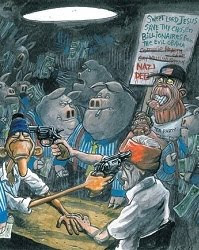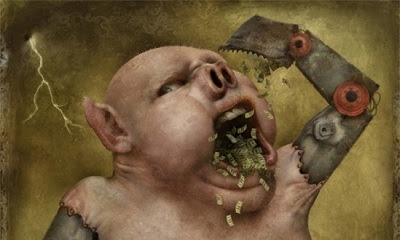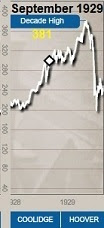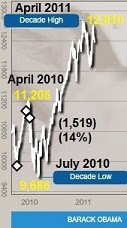Up, Down, Appendices, Postscript.
 Music this week from Chet Baker Almost Blue ...
Music this week from Chet Baker Almost Blue ...... a sordid and ambiguous tale.
Human flourishing: I knew it's one of the eu-words, and eventually found 'eudaimonia' at Wikipedia. Here's a strange thing though - it appears not to be in the OED (?), instead they show eudemony/eudaemony; no -ia endings at all in this zone. Curious. Unlike euphoria/euphory; euphonia/euphony; eutrapelia/eutrapely (new one on me) with both - I wish I had the full 24 volume hard-copy at hand (!).

 "The last thought we wish to offer is that man must explore himself - his goals and values - as much as the world he seeks to change. The dedication to both tasks must be unending. The crux of the matter is not only whether the human species will survive, but even more whether it can survive without falling into a state of worthless existence."
"The last thought we wish to offer is that man must explore himself - his goals and values - as much as the world he seeks to change. The dedication to both tasks must be unending. The crux of the matter is not only whether the human species will survive, but even more whether it can survive without falling into a state of worthless existence."The last few sentences of Limits to Growth, the final two words, written in 1972 by the Executive Committee of The Club of Rome: Alexander King, Saburo Okita, Aurelio Peccei, Eduard Pestel, Hugo Thiemann, & Carroll Wilson.
The complete & original text can be found here.
What could they have meant by it, this 'worthless existence'? No idea. Not much in the potted bios and few pictures I can find of them - except that they seem to have had good lives. I imagined the opposite of human flourishing would be some disaster, some physical Armageddon or Apocalypse (or even just an apocalypse), but a spiritual death?
Is that it?
I fetched up on this phrase once before. This week I have just been standing in front of it, facing it perhaps but finding no clue ...
 The last time I was in Newfoundland I imagined writing a book called Strip Mining the Human Soul. Today I am imagining another - Butting Heads with Liebniz. Iknowiknowiknow, Voltaire already did that (Candide) ... this would be a sort-of update, starting with the Metcalfe councillor who said to me one day, "You can't stand in the way of progress," and ending (hopefully) in a garden with Candide & Cunégonde.
The last time I was in Newfoundland I imagined writing a book called Strip Mining the Human Soul. Today I am imagining another - Butting Heads with Liebniz. Iknowiknowiknow, Voltaire already did that (Candide) ... this would be a sort-of update, starting with the Metcalfe councillor who said to me one day, "You can't stand in the way of progress," and ending (hopefully) in a garden with Candide & Cunégonde.
 Waltzing Matilda ... somewhere I read that 'Waltzing Matilda' was the staggering towards death of men chained to a rock in the Botany Bay (Sydney) harbour during the early days of the penal colony.
Waltzing Matilda ... somewhere I read that 'Waltzing Matilda' was the staggering towards death of men chained to a rock in the Botany Bay (Sydney) harbour during the early days of the penal colony.Voting with your feet ...
Hannah Arendt Sonning Prize acceptance speech, 1975: "This falling of dusk, the darkening of the public scene, however, did not take place in silence by any means. On the contrary, never was the public scene so filled with public announcements, usually quite optimistic, and the noise that moved the air was composed not only of the propaganda slogans of the two antagonistic ideologies, each promising a different wave of the future, but also by the down-to-earth statements of respectable politicians and statements from left-of-center, right-of-center, and center, all of which together had the net effect of desubstantializing every issue they touched, in addition to confusing utterly the minds of their audiences."
The lost generations which Arendt goes on to talk about are also mentioned by Isak Dinesen in Out of Africa which I am now reading ... what a gracious story! What a gracious woman! Oh, a bit condescending at times, maybe, lets her aristocratic dog off its leash too often maybe ... but delightful. This may not be true in her other writing; so I have asked the library for a few more (Anecdotes of Destiny & Seven Gothic Tales).
  |

 You can watch him rallying the consumer troops last week here (pay close attention to the pauses and stumbles). "We’ve always been and always will be a AAA country," he says. What's that? AAA? Avaricious, Astigmatic, & Arrogant? Asthmatic, Amoral, & Afogago? And later, "The values that bind us together as a nation," (values?) ditto.
You can watch him rallying the consumer troops last week here (pay close attention to the pauses and stumbles). "We’ve always been and always will be a AAA country," he says. What's that? AAA? Avaricious, Astigmatic, & Arrogant? Asthmatic, Amoral, & Afogago? And later, "The values that bind us together as a nation," (values?) ditto.Drew Westen asks, What Happened to Obama? I think he exaggerates - I watched the Inaugural Address and thought I was hearing a new narrative - it was in the months following that I stopped paying close enough attention. Hell! He got the goddam Peace Prize! Those guys know what they're doing, don't they?
The alternate headline on it is "What happened to Obama's passion?" which is telling too in a way. But yeah, what happened to him? Since he is (as he should be) the epitome of his nation.
You can see it clearly in this NYT editorial - a spectacular display of ostrich-ism and clichés.
 As I read the comments on this editorial, it came to me that the rich may be thinking they will just dispense with the rest of the population of the planet (except of course the ones with nice tits and a winning smile) and hide - voting with their feet so to speak, in their own inimitable way, but on the other side of the street. If that's the plan they had better get a move on quick - because once the tip really hits, gated communities are not gonna be nearly enough - oh, keep out the hoi polloi, alright, no problem, but keep out the wind?
As I read the comments on this editorial, it came to me that the rich may be thinking they will just dispense with the rest of the population of the planet (except of course the ones with nice tits and a winning smile) and hide - voting with their feet so to speak, in their own inimitable way, but on the other side of the street. If that's the plan they had better get a move on quick - because once the tip really hits, gated communities are not gonna be nearly enough - oh, keep out the hoi polloi, alright, no problem, but keep out the wind?Meanwhile Stephen Harper courts the likes of Honduras' Porfirio Lobo Sosa & Columbia's Juan Manuel Santos Calderón as he busily establishes more free-trade zones. There was a hint of a hitch in the gitalong with Dilma Rouseff, but it doesn't matter - same crap-o-la different page.
And instructs his trusty sidekick Peter Kent to OK another coal-fired generating plant in Grande Cache Alberta just in time to beat his very own (lame) 'emissions regulations'. More on this later because as it turns out there is a personal angle.
A-and a new kid on the endocrine disruptor front: Perfluorooctanesulfonic acid (PFOS), a component of fire-fighting foam, active at Parts Per Billion.
 A-and Shell Oil / Royal Dutch Shell - What can you say about them? Past: They fucked over Nigeria, big time, repeatedly & violently in every orifice, over five decades and more - first well came in 1956 (Guardian: Shell has admitted liability but has a long way to go to make amends). Present: Are fucking up the North Sea as we speak (BBC: Shell fights spill near North Sea oil platform) not a blowout mind you, just bad piping, but they can't seem to either find or fix it. ... Poor wee babies! Future: Better give 'em the Beaufort Sea to fuck with then, (Shell Gets Tentative Approval to Drill in Arctic). Yeah. Right.
A-and Shell Oil / Royal Dutch Shell - What can you say about them? Past: They fucked over Nigeria, big time, repeatedly & violently in every orifice, over five decades and more - first well came in 1956 (Guardian: Shell has admitted liability but has a long way to go to make amends). Present: Are fucking up the North Sea as we speak (BBC: Shell fights spill near North Sea oil platform) not a blowout mind you, just bad piping, but they can't seem to either find or fix it. ... Poor wee babies! Future: Better give 'em the Beaufort Sea to fuck with then, (Shell Gets Tentative Approval to Drill in Arctic). Yeah. Right.There is also a political solution, C. - but I can't see any sign of it (but WTF do I know?). Nada. Zip. Zipp-o-la!
Not gonna be pretty. Not pretty now.
Somehow from Chet Baker to the end of Isaiah 1: "For ye shall be as an oak whose leaf fadeth, and as a garden that hath no water. And the strong shall be as tow, and the maker of it as a spark, and they shall both burn together, and none shall quench them."
 (The 'they shall both burn' in there is all of us AND whatever passes for an omnipotent diety - that's my reading of it.)
(The 'they shall both burn' in there is all of us AND whatever passes for an omnipotent diety - that's my reading of it.)And on through "every junkie's like a setting sun" Neil's been singing early and late ...
 I have been running into phrases like this all week: "You do not understand, you will never understand." Reading Julian Barnes' The Sense of an Ending and he keeps on with, "You just don't get it, do you? But then you never did," in various formulations as a refrain at the ends of his sections.
I have been running into phrases like this all week: "You do not understand, you will never understand." Reading Julian Barnes' The Sense of an Ending and he keeps on with, "You just don't get it, do you? But then you never did," in various formulations as a refrain at the ends of his sections. "You know something's happening, but you don't know what it is, do you, Mr. Jones?" Oh well ... OK. It's true then - I don't, never did, never will. And Dylan's other great judgement applies as well: "He not busy being born is busy dying."
"You know something's happening, but you don't know what it is, do you, Mr. Jones?" Oh well ... OK. It's true then - I don't, never did, never will. And Dylan's other great judgement applies as well: "He not busy being born is busy dying." And so on. Sorry about that.
And so on. Sorry about that.Thanks to Altino Machado for putting this into motion.
Did I forget to mention that the 'darkening of the public scene' our Hannah talks about is the humus from which springs ... who knows what wierdness?
"O come, turtles, come; and eat the bastarding jellyfish." (Euan Ferguson)
Be well.
Postscript:
I wanted to throw in Gwynne Dyer's latest - here it is at Georgia Strait, with a headline - "Food crisis looms as a result of cutbacks in irrigation" - that seems to imply it is a matter of choice (?). But OK, by the time that link dies it will probably be up at his own site.
Oops - he's catching up! - it is there already: The Food Bubble.
Opa! Esqueci que hoje é Dia dos Pais. Mas o meu anjo da guarda não esqueceu de mim, não - ela enviou 'um grande beijo do tamanho do céu.' E já chegou também, um milagre - quem iria imaginar? Dentro da chuva Perseidas, entre as estrelas cadentes desta temporada foi um beijo pra mim - uma bênção de verdade. Ai ai ai. Que bom mesmo! Obrigado querida.
Appendices:
1. Britain fears its ‘rebels without a cause’, Olivia Ward, August 9 2011.
2. Where Will Growth Come From?, NYT Editorial, August 10 2011.
3. What Happened to Obama?, Drew Westen, August 6 2011.
Britain fears its ‘rebels without a cause’, Olivia Ward, August 9 2011.
Some came for the candy. Others carried off flat-screen TVs and smart phones. And still others heaved bricks through windows and set fire to cars in an ecstasy of violence that has terrified British onlookers.
This is not the Britain of stiff upper lips and “carry on regardless,” the country that won its reputation for pulling together during two world wars.
The riots that have smashed their way from north London to the southern and eastern suburbs, Liverpool and beyond are all the more frightening, experts say, because they have no clear cause. But they bubble up from dangerous undercurrents in society.
“This is not Britain’s Tahrir Square,” said Dan Leighton, an associate of the London political think-tank Demos. “But its very lack of political motivation makes it even more worrying — and even more political.”
The divisions of British society have widened in past decades and inequality is still growing. And with the ongoing financial crisis, and a massive media phone-hacking scandal that involves bribery of police, the British body politic has been buffeted from all sides. With the riots, it is a perfect storm.
“In Britain you have the top 1 per cent who continue to earn unimaginable money in the midst of austerity, then the squeezed middle class, and then the ‘stakelessness’ of young people who are excluded and have no respect for the norms of society,” said Leighton. “It’s a situation that has been brewing for 20 years.”
Leighton organizes for Compass, a new public interest group that created an online petition to restore the public interest, declaring that “something is unravelling before our eyes. From bankers to media-barons, private interests have bankrupted and corrupted the public realm.”
But social purpose seems irrelevant to the rioters and looters who have destroyed small businesses, homes and cars in their own neighbourhoods, also joining mobile “flash mobs” called up on BlackBerrys and social media.
“Riots are about power, and they are about catharsis,” writes 24-year-old London blogger Laura Penny. “People riot because it makes them feel powerful, even if only for a night. People riot because they have spent their whole lives being told that they are good for nothing and they realize that together they can do anything — literally anything at all.”
The volatile mix of anger, opportunism and hopelessness appears to have produced a nihilism that’s different from earlier generation riots, which focused on racial tension, police brutality or tax protests.
It is fuelled by the amorality of the “feral elites” who helped to wreck the economy, while on an endless spending spree of London’s outrageously priced luxury goods and real estate. Big-ticket items the unemployed and working poor can only view through polished windows.
“It’s trickle-down morality,” says Stephen Whitehead, a researcher with the New Economics Foundation in London. “The looters wouldn’t say they were redressing the wealth gap in a progressive political agenda. But they don’t see why they should care about doing damage when the wealthiest are rewarded for it.”
London has tried to plug the gap between rich and poor by placing public housing next door to multi-million-dollar homes. But cuts to housing benefits will soon force the poorest out to the perimeters.
“Rich and poor may be living side by side but it only makes the everyday inequality more obvious,” says philosophy lecturer Nina Power of Roehampton University a campaigner for students’ rights. “The New Labour government pushed personal debt, credit cards and student loans to keep the economy going. But the 2008 (meltdown) ended all that.
“Now there are no positive programs, and no big ideas of what society should be like. If people are stealing it’s not just mindless theft. They have got the consumerist thing, but without any money. They can get things they want, and sell them to make money. But it’s not just the ‘I want’ mentality. Some believe there’s no other way.”
Where Will Growth Come From?, NYT Editorial, August 10 2011.
Never has the world economy depended so much on the success of developing nations. A misguided focus on budget cutting has plunged the European Union and the United States down paths that will prolong their economic stagnation and perhaps tip them into another recession. The International Monetary Fund was forecasting 2 percent growth in the euro zone before the financial crisis spread to Italy. The Japanese economy is shrinking. Some top economists put the odds of a double-dip recession in the United States at 1 in 2.
These dire prospects, along with the realization that economic policy is blocked by political gridlock in the United States and complacency in Europe, have sent spasms through financial markets, which could further sap growth. Fortunately, developing countries, which account for almost half the globe’s economic output, are growing faster than the industrialized world: in June the I.M.F. forecast that they would grow some 6.5 percent this year and next. Their growth spares the world utter economic stagnation.
Yet developing countries are not robust enough to keep the global economy from sinking in a morass for long. Their economies remain vulnerable to financial turbulence and economic weakness in wealthy nations.
Even a flood of money moving to developing nations, as investors react to the lack of growth in the industrial world, would create new challenges. It would stoke inflation and asset bubbles in developing economies: annual inflation in Brazil is running at 6.85 percent. And it would push up the value of their currencies, hindering exports.
China, the biggest developing economy, is still more a caboose than a growth engine, dependent on rich countries to buy more than 40 percent of its exports. In 2009, China led efforts to help the global recovery, investing heavily in infrastructure and boosting consumer spending, but today it is taking the opposite tack and trying to combat inflation, which is running at 6.4 percent.
To keep its goods cheap, it has allowed its currency to rise only about 6 percent against the dollar since June 2010, even as the dollar has plunged against other currencies. Last month, the I.M.F. called on China to help global growth by letting the currency appreciate more rapidly, which would make Chinese goods more expensive around the world and give a break to competing manufacturers.
China has so far resisted that advice. It lashed out at economic mismanagement in Washington after the Standard & Poor’s downgrade, which could potentially reduce the value of its $1.1 trillion stash of American Treasury bonds. Rather than berate Washington, it should abandon its currency manipulation. China’s leaders have said they want to put more money in the hands of consumers through social programs and higher wages, and to rely less on exports. They can do this without stoking inflation by allowing the renminbi to rise significantly.
The burden of global growth cannot be placed on China alone. Germany has the third-largest trade surplus in the world, after China and Japan, sapping growth in its European neighbors. The United States and the European Union must focus more on spurring economic growth. They should have all along.
What Happened to Obama?, Drew Westen, August 6 2011.
Drew Westen is a professor of psychology at Emory University.
Atlanta
IT was a blustery day in Washington on Jan. 20, 2009, as it often seems to be on the day of a presidential inauguration. As I stood with my 8-year-old daughter, watching the president deliver his inaugural address, I had a feeling of unease. It wasn’t just that the man who could be so eloquent had seemingly chosen not to be on this auspicious occasion, although that turned out to be a troubling harbinger of things to come. It was that there was a story the American people were waiting to hear — and needed to hear — but he didn’t tell it. And in the ensuing months he continued not to tell it, no matter how outrageous the slings and arrows his opponents threw at him.
The stories our leaders tell us matter, probably almost as much as the stories our parents tell us as children, because they orient us to what is, what could be, and what should be; to the worldviews they hold and to the values they hold sacred. Our brains evolved to “expect” stories with a particular structure, with protagonists and villains, a hill to be climbed or a battle to be fought. Our species existed for more than 100,000 years before the earliest signs of literacy, and another 5,000 years would pass before the majority of humans would know how to read and write.
Stories were the primary way our ancestors transmitted knowledge and values. Today we seek movies, novels and “news stories” that put the events of the day in a form that our brains evolved to find compelling and memorable. Children crave bedtime stories; the holy books of the three great monotheistic religions are written in parables; and as research in cognitive science has shown, lawyers whose closing arguments tell a story win jury trials against their legal adversaries who just lay out “the facts of the case.”
When Barack Obama rose to the lectern on Inauguration Day, the nation was in tatters. Americans were scared and angry. The economy was spinning in reverse. Three-quarters of a million people lost their jobs that month. Many had lost their homes, and with them the only nest eggs they had. Even the usually impervious upper middle class had seen a decade of stagnant or declining investment, with the stock market dropping in value with no end in sight. Hope was as scarce as credit.
In that context, Americans needed their president to tell them a story that made sense of what they had just been through, what caused it, and how it was going to end. They needed to hear that he understood what they were feeling, that he would track down those responsible for their pain and suffering, and that he would restore order and safety. What they were waiting for, in broad strokes, was a story something like this:
“I know you’re scared and angry. Many of you have lost your jobs, your homes, your hope. This was a disaster, but it was not a natural disaster. It was made by Wall Street gamblers who speculated with your lives and futures. It was made by conservative extremists who told us that if we just eliminated regulations and rewarded greed and recklessness, it would all work out. But it didn’t work out. And it didn’t work out 80 years ago, when the same people sold our grandparents the same bill of goods, with the same results. But we learned something from our grandparents about how to fix it, and we will draw on their wisdom. We will restore business confidence the old-fashioned way: by putting money back in the pockets of working Americans by putting them back to work, and by restoring integrity to our financial markets and demanding it of those who want to run them. I can’t promise that we won’t make mistakes along the way. But I can promise you that they will be honest mistakes, and that your government has your back again.” A story isn’t a policy. But that simple narrative — and the policies that would naturally have flowed from it — would have inoculated against much of what was to come in the intervening two and a half years of failed government, idled factories and idled hands. That story would have made clear that the president understood that the American people had given Democrats the presidency and majorities in both houses of Congress to fix the mess the Republicans and Wall Street had made of the country, and that this would not be a power-sharing arrangement. It would have made clear that the problem wasn’t tax-and-spend liberalism or the deficit — a deficit that didn’t exist until George W. Bush gave nearly $2 trillion in tax breaks largely to the wealthiest Americans and squandered $1 trillion in two wars.
[2]
And perhaps most important, it would have offered a clear, compelling alternative to the dominant narrative of the right, that our problem is not due to spending on things like the pensions of firefighters, but to the fact that those who can afford to buy influence are rewriting the rules so they can cut themselves progressively larger slices of the American pie while paying less of their fair share for it.
But there was no story — and there has been none since.
In similar circumstances, Franklin D. Roosevelt offered Americans a promise to use the power of his office to make their lives better and to keep trying until he got it right. Beginning in his first inaugural address, and in the fireside chats that followed, he explained how the crash had happened, and he minced no words about those who had caused it. He promised to do something no president had done before: to use the resources of the United States to put Americans directly to work, building the infrastructure we still rely on today. He swore to keep the people who had caused the crisis out of the halls of power, and he made good on that promise. In a 1936 speech at Madison Square Garden, he thundered, “Never before in all our history have these forces been so united against one candidate as they stand today. They are unanimous in their hate for me — and I welcome their hatred.”
When Barack Obama stepped into the Oval Office, he stepped into a cycle of American history, best exemplified by F.D.R. and his distant cousin, Teddy. After a great technological revolution or a major economic transition, as when America changed from a nation of farmers to an urban industrial one, there is often a period of great concentration of wealth, and with it, a concentration of power in the wealthy. That’s what we saw in 1928, and that’s what we see today. At some point that power is exercised so injudiciously, and the lives of so many become so unbearable, that a period of reform ensues — and a charismatic reformer emerges to lead that renewal. In that sense, Teddy Roosevelt started the cycle of reform his cousin picked up 30 years later, as he began efforts to bust the trusts and regulate the railroads, exercise federal power over the banks and the nation’s food supply, and protect America’s land and wildlife, creating the modern environmental movement.
Those were the shoes — that was the historic role — that Americans elected Barack Obama to fill. The president is fond of referring to “the arc of history,” paraphrasing the Rev. Dr. Martin Luther King Jr.’s famous statement that “the arc of the moral universe is long, but it bends toward justice.” But with his deep-seated aversion to conflict and his profound failure to understand bully dynamics — in which conciliation is always the wrong course of action, because bullies perceive it as weakness and just punch harder the next time — he has broken that arc and has likely bent it backward for at least a generation.
When Dr. King spoke of the great arc bending toward justice, he did not mean that we should wait for it to bend. He exhorted others to put their full weight behind it, and he gave his life speaking with a voice that cut through the blistering force of water cannons and the gnashing teeth of police dogs. He preached the gospel of nonviolence, but he knew that whether a bully hid behind a club or a poll tax, the only effective response was to face the bully down, and to make the bully show his true and repugnant face in public.
IN contrast, when faced with the greatest economic crisis, the greatest levels of economic inequality, and the greatest levels of corporate influence on politics since the Depression, Barack Obama stared into the eyes of history and chose to avert his gaze. Instead of indicting the people whose recklessness wrecked the economy, he put them in charge of it. He never explained that decision to the public — a failure in storytelling as extraordinary as the failure in judgment behind it. Had the president chosen to bend the arc of history, he would have told the public the story of the destruction wrought by the dismantling of the New Deal regulations that had protected them for more than half a century. He would have offered them a counternarrative of how to fix the problem other than the politics of appeasement, one that emphasized creating economic demand and consumer confidence by putting consumers back to work. He would have had to stare down those who had wrecked the economy, and he would have had to tolerate their hatred if not welcome it. But the arc of his temperament just didn’t bend that far.
[3]
The truly decisive move that broke the arc of history was his handling of the stimulus. The public was desperate for a leader who would speak with confidence, and they were ready to follow wherever the president led. Yet instead of indicting the economic policies and principles that had just eliminated eight million jobs, in the most damaging of the tic-like gestures of compromise that have become the hallmark of his presidency — and against the advice of multiple Nobel-Prize-winning economists — he backed away from his advisers who proposed a big stimulus, and then diluted it with tax cuts that had already been shown to be inert. The result, as predicted in advance, was a half-stimulus that half-stimulated the economy. That, in turn, led the White House to feel rightly unappreciated for having saved the country from another Great Depression but in the unenviable position of having to argue a counterfactual — that something terrible might have happened had it not half-acted.
To the average American, who was still staring into the abyss, the half-stimulus did nothing but prove that Ronald Reagan was right, that government is the problem. In fact, the average American had no idea what Democrats were trying to accomplish by deficit spending because no one bothered to explain it to them with the repetition and evocative imagery that our brains require to make an idea, particularly a paradoxical one, “stick.” Nor did anyone explain what health care reform was supposed to accomplish (other than the unbelievable and even more uninspiring claim that it would “bend the cost curve”), or why “credit card reform” had led to an increase in the interest rates they were already struggling to pay. Nor did anyone explain why saving the banks was such a priority, when saving the homes the banks were foreclosing didn’t seem to be. All Americans knew, and all they know today, is that they’re still unemployed, they’re still worried about how they’re going to pay their bills at the end of the month and their kids still can’t get a job. And now the Republicans are chipping away at unemployment insurance, and the president is making his usual impotent verbal exhortations after bargaining it away.
What makes the “deficit debate” we just experienced seem so surreal is how divorced the conversation in Washington has been from conversations around the kitchen table everywhere else in America. Although I am a scientist by training, over the last several years, as a messaging consultant to nonprofit groups and Democratic leaders, I have studied the way voters think and feel, talking to them in plain language. At this point, I have interacted in person or virtually with more than 50,000 Americans on a range of issues, from taxes and deficits to abortion and immigration.
The average voter is far more worried about jobs than about the deficit, which few were talking about while Bush and the Republican Congress were running it up. The conventional wisdom is that Americans hate government, and if you ask the question in the abstract, people will certainly give you an earful about what government does wrong. But if you give them the choice between cutting the deficit and putting Americans back to work, it isn’t even close. But it’s not just jobs. Americans don’t share the priorities of either party on taxes, budgets or any of the things Congress and the president have just agreed to slash — or failed to slash, like subsidies to oil companies. When it comes to tax cuts for the wealthy, Americans are united across the political spectrum, supporting a message that says, “In times like these, millionaires ought to be giving to charity, not getting it.”
When pitted against a tough budget-cutting message straight from the mouth of its strongest advocates, swing voters vastly preferred a message that began, “The best way to reduce the deficit is to put Americans back to work.” This statement is far more consistent with what many economists are saying publicly — and what investors apparently believe, as evident in the nosedive the stock market took after the president and Congress “saved” the economy.
So where does that leave us?
[4]
Like most Americans, at this point, I have no idea what Barack Obama — and by extension the party he leads — believes on virtually any issue. The president tells us he prefers a “balanced” approach to deficit reduction, one that weds “revenue enhancements” (a weak way of describing popular taxes on the rich and big corporations that are evading them) with “entitlement cuts” (an equally poor choice of words that implies that people who’ve worked their whole lives are looking for handouts). But the law he just signed includes only the cuts. This pattern of presenting inconsistent positions with no apparent recognition of their incoherence is another hallmark of this president’s storytelling. He announces in a speech on energy and climate change that we need to expand offshore oil drilling and coal production — two methods of obtaining fuels that contribute to the extreme weather Americans are now seeing. He supports a health care law that will use Medicaid to insure about 15 million more Americans and then endorses a budget plan that, through cuts to state budgets, will most likely decimate Medicaid and other essential programs for children, senior citizens and people who are vulnerable by virtue of disabilities or an economy that is getting weaker by the day. He gives a major speech on immigration reform after deporting around 800,000 immigrants in two years, a pace faster than nearly any other period in American history.
THE real conundrum is why the president seems so compelled to take both sides of every issue, encouraging voters to project whatever they want on him, and hoping they won’t realize which hand is holding the rabbit. That a large section of the country views him as a socialist while many in his own party are concluding that he does not share their values speaks volumes — but not the volumes his advisers are selling: that if you make both the right and left mad, you must be doing something right.
As a practicing psychologist with more than 25 years of experience, I will resist the temptation to diagnose at a distance, but as a scientist and strategic consultant I will venture some hypotheses.
The most charitable explanation is that he and his advisers have succumbed to a view of electoral success to which many Democrats succumb — that “centrist” voters like “centrist” politicians. Unfortunately, reality is more complicated. Centrist voters prefer honest politicians who help them solve their problems. A second possibility is that he is simply not up to the task by virtue of his lack of experience and a character defect that might not have been so debilitating at some other time in history. Those of us who were bewitched by his eloquence on the campaign trail chose to ignore some disquieting aspects of his biography: that he had accomplished very little before he ran for president, having never run a business or a state; that he had a singularly unremarkable career as a law professor, publishing nothing in 12 years at the University of Chicago other than an autobiography; and that, before joining the United States Senate, he had voted "present" (instead of "yea" or "nay") 130 times, sometimes dodging difficult issues.
A somewhat less charitable explanation is that we are a nation that is being held hostage not just by an extremist Republican Party but also by a president who either does not know what he believes or is willing to take whatever position he thinks will lead to his re-election. Perhaps those of us who were so enthralled with the magnificent story he told in “Dreams From My Father” appended a chapter at the end that wasn’t there — the chapter in which he resolves his identity and comes to know who he is and what he believes in.
Or perhaps, like so many politicians who come to Washington, he has already been consciously or unconsciously corrupted by a system that tests the souls even of people of tremendous integrity, by forcing them to dial for dollars — in the case of the modern presidency, for hundreds of millions of dollars. When he wants to be, the president is a brilliant and moving speaker, but his stories virtually always lack one element: the villain who caused the problem, who is always left out, described in impersonal terms, or described in passive voice, as if the cause of others’ misery has no agency and hence no culpability. Whether that reflects his aversion to conflict, an aversion to conflict with potential campaign donors that today cripples both parties’ ability to govern and threatens our democracy, or both, is unclear.
A final explanation is that he ran for president on two contradictory platforms: as a reformer who would clean up the system, and as a unity candidate who would transcend the lines of red and blue. He has pursued the one with which he is most comfortable given the constraints of his character, consistently choosing the message of bipartisanship over the message of confrontation.
But the arc of history does not bend toward justice through capitulation cast as compromise. It does not bend when 400 people control more of the wealth than 150 million of their fellow Americans. It does not bend when the average middle-class family has seen its income stagnate over the last 30 years while the richest 1 percent has seen its income rise astronomically. It does not bend when we cut the fixed incomes of our parents and grandparents so hedge fund managers can keep their 15 percent tax rates. It does not bend when only one side in negotiations between workers and their bosses is allowed representation. And it does not bend when, as political scientists have shown, it is not public opinion but the opinions of the wealthy that predict the votes of the Senate. The arc of history can bend only so far before it breaks.
Down.














 Another month's bar on the FAO Food Price Index and the level trend continues, a plateau. I thought it was the monthly
Another month's bar on the FAO Food Price Index and the level trend continues, a plateau. I thought it was the monthly 
























